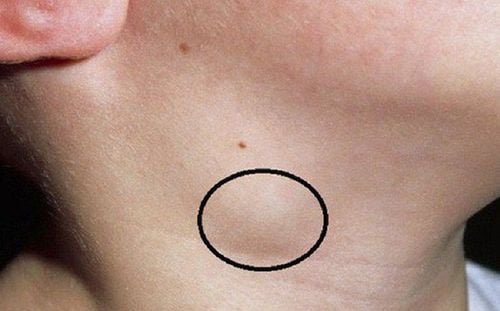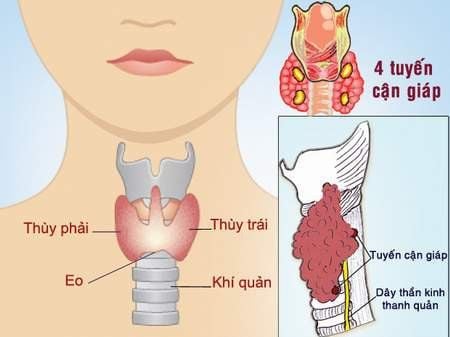This is an automatically translated article.
Thyroidectomy is one of the treatments for thyroid-related diseases. However, many people wonder when it is necessary to have a total thyroidectomy and is there any effect after the surgery?
1. The role of the thyroid gland in the body
The thyroid gland plays a very important role for the general functioning of the endocrine system, the thyroid gland participates in many important processes in the body, ensuring normal metabolism. The function of the thyroid gland is to produce essential hormones for the body, to ensure normal metabolism and cardiovascular activity. At the same time, thyroid hormone also contributes to the overall development of the body. When thyroid function declines, health will be affected more or less, at this time, the patient should actively go for a health check.2. When to have thyroidectomy?
Today, along with the development of medicine, many methods are applied to treat thyroid-related diseases, including partial or total thyroidectomy. However, this does not mean that any thyroid problem can be treated with thyroidectomy. Depending on each person's medical condition, the doctor will recommend the most appropriate treatment regimen for the patient and decide whether to remove the thyroid gland or not after weighing the benefits and risks.
2.1. Partial thyroidectomy There are two types of thyroidectomy: partial thyroidectomy and total thyroidectomy. For patients treated for benign thyroid tumors with too large size, the doctor will appoint a partial thyroidectomy, this is a way to help the organs around the thyroid gland not be compressed, not suffer too much. a lot of pressure from large size tumor.
The method of partial thyroidectomy is also applied in cases of newly detected malignant thyroid tumors in the early stages, when the tumor size is small, or partial thyroidectomy in the case of multinodular goiter but the part Many healthy tissues, thyroid cysts.
2.2. Total thyroidectomy For patients with thyroid cancer, when cancer cells invade or metastasize to other organs, or when the tumor size is larger than 4cm, especially in the elderly, At this time, the doctor will usually recommend a total thyroidectomy. For cancer patients, radioactive iodine treatment can be indicated after surgery to completely remove the causative agent.
3. Thyroidectomy
There are two methods of thyroidectomy as follows:
Laparoscopic: The doctor will make an incision under the skin about 2-3cm in the armpit or chest. The doctor will then insert endoscopic instruments, through which the entire thyroid gland is removed. This method makes the incision more aesthetic, less traumatized, less painful, reduces the risk of infection and has a faster recovery time. Open surgery: The doctor will make an incision about 10cm long in the neck crease, then proceed to cut the thyroid gland. Open surgery costs less but will leave a scar on the neck that is unsightly and has a longer recovery time.
4. What is the effect of total thyroidectomy?
Thyroidectomy is a safe method, with few risks or dangerous complications. However, to answer the question of whether total thyroidectomy has any effect, the answer is yes, the degree of influence depends on many factors such as location, surgeon's skill and care. postoperative care. Possible effects after thyroidectomy:
Similar to major surgery, patients undergoing thyroidectomy are at increased risk of adverse reactions to general anesthesia with manifestations such as nausea and vomiting. , vomiting, stiff neck, sore throat, difficulty swallowing... ; Hypothyroidism: Although removal of the entire thyroid gland completely cures pre-existing thyroid disease, this method can cause hypothyroidism. Therefore, patients need to take thyroid hormone replacement medicine (levothyroxine) once a day for the rest of their life. Patients can completely control hypothyroidism by following the doctor's treatment instructions; Bleeding immediately after surgery can lead to acute respiratory failure: The average amount of blood loss during a total thyroidectomy is usually small (less than a tablespoon), the possibility of needing a blood transfusion is extremely rare However, bleeding into the tissues around the neck can be life-threatening because the blood clot can press on the patient's windpipe causing difficulty breathing, which usually occurs within 24 hours of surgical removal. However, in 10-28% of cases, bleeding in the neck may last longer. Patients need to be closely monitored for signs of: shortness of breath, high-pitched voice, dizziness, wheezing, increasing neck pain, neck swelling (usually swelling below the incision) ... then the patient should go to the hospital. hospital for treatment. Injury to the recurrent laryngeal nerve causing temporary (5 - 10%) or permanent (about 1%) hoarseness; Acute respiratory failure (very rare) due to nerve damage; Damage to the parathyroid gland (the organ that controls blood calcium levels): causes temporary hypoparathyroidism, hypoparathyroidism, and hypocalcemia. The parathyroid glands are 4 small glands the size of a grain of rice located behind the thyroid gland to help control calcium levels. Each lobe of the thyroid gland has 2 parathyroid glands. If all 4 glands are injured or removed, blood calcium levels can increase. becoming lower than normal causes hypocalcemia, leading to temporary or permanent hypoparathyroidism (5 to 10% of cases) with symptoms such as numbness and tingling (especially around the lips, hands, and feet). feet), a feeling of cramping. Permanent hypoparathyroidism requires taking calcium or vitamin D for life, so before being discharged home, the patient will be checked for calcium in the blood to appoint calcium or vitamin D supplements in 1-2 weeks. during total thyroidectomy. Post-operative infection (rate 1/2,000): need to be treated with antibiotics; Seroma: an accumulation of fluid (such as serum, sterile body fluids) beneath the skin at the site of the incision, which usually disappears within a few weeks, However, if the condition becomes severe, it requires surgery. drainage.
5. Thyroidectomy time
The time of thyroidectomy surgery takes about 30-60 minutes, after surgery, it takes about 3 hours to recover after surgery, the treatment time after thyroidectomy lasts about 3-5 days depending on the health status health of each patient and the ability to self-heal after surgery.
6. Caring for patients after thyroidectomy
In order not to hurt the incision, the doctor advises the patient to take a break from 1-2 weeks after surgery, minimize strenuous activities because at this time, the patient's health is still weak and the wound is still weak. surgery is very traumatic. The next time the patient should exercise on his own, practice some gentle exercises to help the body reduce fatigue after surgery, and at the same time reduce pain in the neck. If there is swelling and numbness in the neck after thyroidectomy, the patient does not need to be too worried because this is a common sign in thyroid surgery patients, it will usually heal quickly after 5-7 days. Patients after thyroidectomy should only eat soft, easy-to-swallow foods such as porridge, soup...
Please dial HOTLINE for more information or register for an appointment HERE. Download MyVinmec app to make appointments faster and to manage your bookings easily.













